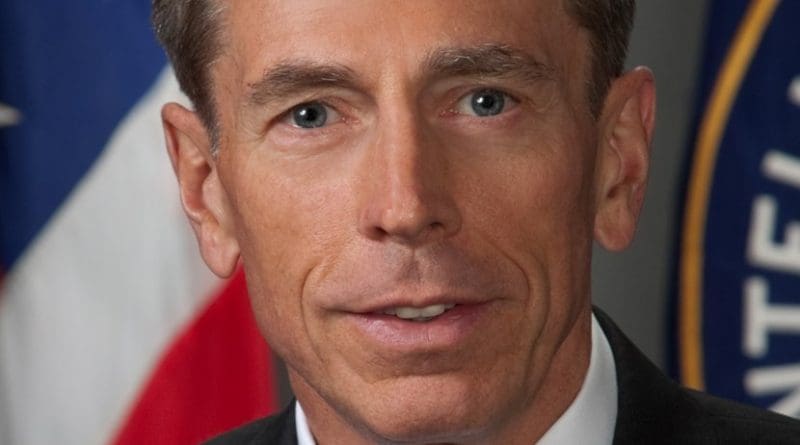CIA Covert Operations Compromised By Petraeus’ Indiscretion – OpEd
By Jim Kouri
Breaking news stories on Tuesday and Wednesday focused on the misuse of former-director of the CIA Gen. David Petraeus’ email accounts, his mistress, Paula Broadwell, and her alleged possession of classified documents on her computer, which she may have stolen from her lover, and Broadwell’s threatening emails to a third person.
Such serious security-related problems plaguing the director of the super-secret CIA is most troubling since he has complete access to information about covert operations, in addition to top secret intelligence, claim members of intelligence and counterterrorism organizations.
According to sources, the Obama Administration believes that covert action must be consistent with specific U.S. foreign policy objectives in a targeted area. Covert actions should be undertaken only where there is a compelling reason why U.S. involvement cannot be disclosed.
Covert actions (as distinguished from the covert collection of information) are used to influence political, military, or economic conditions or situations abroad, where it is intended that the role of the U.S. Government will not be apparent or acknowledged publicly.
These might consist of propaganda activities, support to political or military factions within a particular country, technical and logistical assistance to other governments to deal with problems within their countries, or actions undertaken to disrupt illicit activities that threaten US interests, e.g. terrorism or narcotics trafficking. Such actions complement and supplement parallel overt measures such as diplomacy, trade sanctions, or military activities undertaken by the Executive branch. By law, covert actions can be undertaken only in support of an “identifiable” foreign policy objective.
Responsibility for carrying out covert actions rests with the CIA’s clandestine section, whose director is charged by the National Security Act of 1947 to “perform such other functions and duties related to intelligence affecting the national security as the President or the National Security Council may direct.”
By Executive Order, the CIA alone is specifically authorized to undertake covert actions that are individually authorized by the President , although other departments and agencies may also be directed to undertake or support covert actions as the President may authorize.
For example, President Barack Obama recently prohibited CIA officers from interrogating terror suspects, preferring to use FBI agents or others to conduct such functions.
Since the end of the Cold War, the number and size of covert action programs have shrunk substantially, reflecting the extent to which they were prompted by the superpower struggle. Nonetheless since the war on terrorism, these programs continue to be undertaken to support ongoing policy needs.
When the US congress addressed whether the United States should undertake covert action at all, some witnesses expressed the view that there is no longer a need for covert action, and that, on balance, it has caused more problems for the United States than it has solved. The government, they argue, has been frequently embarrassed by such operations and been criticized domestically and abroad as a result. Also, it is argued, covert actions comprise a minute part of the intelligence budget, but require a disproportionate share of management and oversight.
Most witnesses, however, including all of the former cabinet-level officials who addressed the subject, believed it essential for the President to maintain covert action as an option. Citing examples such as the need to disrupt the activities of a terrorist group, hamper the efforts of a rogue state to develop weapons of mass destruction, or prevent narcotics traffickers from manufacturing drugs for shipment into the United States, the proponents argue that the United States should maintain a capability short of military action to achieve its objectives when diplomacy alone cannot do the job.
Further, the range of covert action options should be weighed to ensure that the methods employed are only as aggressive as needed to accomplish the objectives. The costs of disclosure must be carefully assessed, and, where such costs are significant, the operation should be initiated only in the most compelling circumstances.
Some witnesses recommended that paramilitary covert actions — which typically involve arming, training and/or advising foreign forces — be conducted by the Department of Defense rather than the CIA. These individuals argued that the military is better equipped than the CIA to carry out such operations. Others argued that it is neither feasible nor desirable for US military personnel to undertake such covert activities.
Experts conclude that responsibility for paramilitary covert actions should remain with the CIA. CIA has extraordinary legal authorities and an existing infrastructure that permit the secure conduct of clandestine operations, whereas the military does not. Giving this function to the military would also involve it in a controversial role that would divert attention from other important responsibilities. The military should provide support to paramilitary covert actions as needed but should not be given responsibility for them.
With respect to any changes needed to improve the existing capability, the US Congress notes only that covert action programs of the future are apt increasingly to involve technologies and skills that do not appear to exist within the current infrastructure. More attention should be given to these deficiencies.

